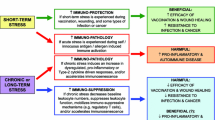Abstract
Increasing numbers of studies are reporting an association between stressful life events and exacerbation in multiple sclerosis. We review findings that begin to suggest psychological, social and biological factors that may be involved in this relationship. Depression, negative attributions, poor coping, and low social support have been implicated as aggravating the relationship between stress and exacerbation. A model of glucocorticoid resistance on immune cells is also presented as one potential biological mechanism. It is emphasized that to date there is no evidence of causal relationships. It is argued that a purely causal relationship, in which stressful events alone trigger exacerbation, is unlikely. Rather, we propose that stress may be one factor among many that influence risk of exacerbation.
Similar content being viewed by others
References
Chrousos GP (1995) The hypothalamic- pituitary-adrenal axis and immune-mediated inflammation. N Engl J Med 332:1351–1362
Dantzer R (2001) Cytokine-induced sickness behavior: mechanisms and implications. Ann N Y Acad Sci 933:222–234
DeRijk RH, Eskandari F, Sternberg EM (2004) Corticosteroid resistance in a subpopulation of multiple sclerosis patients as measured by ex vivo dexamethasone inhibition of LPS induced IL-6 production. J Neuroimmunol 151:180–188
Gold SM, Mohr DC, Huitinga I, Flachenecker P, Sternberg EM, Heesen C (2005) The role of stress-response systems for the pathogenesis and progression of MS. Trends Immunol 26:644–652
Goodkin DE, Rooney WD, Sloan R, Bacchetti P, Gee L, Vermathen M, Waubant E, Abundo M, Majumdar S, Nelson S, Weiner MW (1998) A serial study of new MS lesions and the white matter from which they arise. Neurology 51:1689–1697
McEwen BS (1998) Protective and damaging effects of stress mediators. New England Journal of Medicine 338:171–179
Miller GE, Cohen S, Ritchey AK (2002) Chronic psychological stress and the regulation of pro-inflammatory cytokines: a glucocorticoid-resistance model. Health Psychol 21:531–541
Mohr DC, Boudewyn AC, Genain CP (1999) Relationship between treatment for depression and interferon-gamma in patients with multiple sclerosis. Psychosom Med 61:112
Mohr DC, Goodkin DE, Bacchetti P, Boudewyn AC, Huang L, Marrietta P, Cheuk W, Dee B (2000) Psychological stress and the subsequent appearance of new brain MRI lesions in MS. Neurology 55:55–61
Mohr DC, Goodkin DE, Islar J, Hauser SL, Genain CP (2001) Treatment of depression is associated with suppression of nonspecific and antigen-specific T(H)1 responses in multiple sclerosis. Arch Neurol 58:1081–1086
Mohr DC, Goodkin DE, Nelson S, Cox D, Weiner M (2002) Moderating effects of coping on the relationship between stress and the development of new brain lesions in multiple sclerosis. Psychosom Med 64:803–809
Mohr DC, Genain C (2004) Social support as a buffer in the relationship between treatment for depression and T-cell production of interferon gamma in patients with multiple sclerosis. J Psychosom Res 57:155–158
Mohr DC, Hart SL, Julian L, Cox D, Pelletier D (2004) Association between stressful life events and exacerbation in multiple sclerosis: a meta-analysis. BMJ 328:731
Mohr DC, Pelletier D (2006) A temporal framework for understanding the effects of stressful life events on inflammation in patients with multiple sclerosis. Brain Behav Immun 20:27–36
Morale C, Brouwer J, Testa N, Tirolo C, Barden N, Dijkstra CD, Amor S, Marchetti B (2001) Stress, glucocorticoids and the susceptibility to develop autoimmune disorders of the central nervous system. Neurol Sci 22:159–162
Nisipeanu P, Korczyn AD (1993) Psychological stress as risk factor for exacerbations in multiple sclerosis. Neurology 43:1311–1312
Silver NC, Good CD, Barker GJ, MacManus DG, Thompson AJ, Moseley IF, McDonald WI, Miller DH (1997) Sensitivity of contrast enhanced MRI in multiple sclerosis. Effects of gadolinium dose, magnetization transfer contrast and delayed imaging. Neurology 120:1149–1161
Then Bergh F, Kumpfel T, Trenkwalder C, Rupprecht R, Holsboer F (1999) Dysregulation of the hypothalamopituitary-adrenal axis is related to the clinical course of MS. Neurology 53:772–777
Tortorella C, Codella M, Rocca MA, Gasperini C, Capra R, Bastianello S, Filippi M (1999) Disease activity in multiple sclerosis studied by weekly triple-dose magnetic resonance imaging. J Neurol 246:689–692
Uchino BN, Cacioppo JT, Kiecolt-Glaser JK (1996) The relationship between social support and physiological processes: a review with emphasis on underlying mechanisms and implications for health. Psychol Bull 119:488–531
van Winsen LM, Muris DF, Polman CH, Dijkstra CD, van den Berg TK, Uitdehaag BM (2005) Sensitivity to glucocorticoids is decreased in relapsing remitting multiple sclerosis. J Clin Endocrinol Metab 90:734–740
Warren S, Warren KG, Cockerill R (1991) Emotional stress and coping in multiple sclerosis (MS) exacerbations. J Psychosom Res 35:37–47
Wei T, Lightman SL (1997) The neuroendocrine axis in patients with multiple sclerosis. Brain 120(Pt 6):1067–1076
Author information
Authors and Affiliations
Corresponding author
Additional information
An erratum to this article is available at http://dx.doi.org/10.1007/s00415-008-0901-z.
Rights and permissions
About this article
Cite this article
Mohr, D.C. Stress and multiple sclerosis. J Neurol 254 (Suppl 2), II65–II68 (2007). https://doi.org/10.1007/s00415-007-2015-4
Issue Date:
DOI: https://doi.org/10.1007/s00415-007-2015-4




